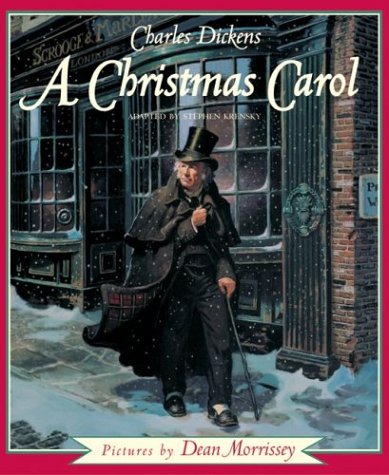All Nonfiction
- Bullying
- Books
- Academic
- Author Interviews
- Celebrity interviews
- College Articles
- College Essays
- Educator of the Year
- Heroes
- Interviews
- Memoir
- Personal Experience
- Sports
- Travel & Culture
All Opinions
- Bullying
- Current Events / Politics
- Discrimination
- Drugs / Alcohol / Smoking
- Entertainment / Celebrities
- Environment
- Love / Relationships
- Movies / Music / TV
- Pop Culture / Trends
- School / College
- Social Issues / Civics
- Spirituality / Religion
- Sports / Hobbies
All Hot Topics
- Bullying
- Community Service
- Environment
- Health
- Letters to the Editor
- Pride & Prejudice
- What Matters
- Back
Summer Guide
- Program Links
- Program Reviews
- Back
College Guide
- College Links
- College Reviews
- College Essays
- College Articles
- Back
A Christmas Carol by Charles Dickens
Mirrored
A Christmas Carol, written by Charles Dickens in 1843, is an inspiring novel that portrays the significant differences between the luxurious lifestyle of the wealthy, as opposed to the unjust, barbaric living conditions impending upon the less fortunate. As always, life isn’t fair, and there really aren’t quite enough comforts to go around in this world. In a society of social hierarchy, poverty, and injustice, money and wealth seem to decide fate: life/death, sickness/cure, and hunger/satisfaction.
Can money buy overall happiness? According to A Christmas Carol, it doesn’t necessarily require obnoxious wealth to be happy, but money can indeed bring content, when spent wisely, as did Ebenezer Scrooge towards the end of the story. For example, while the Cratchits were modestly satisfied with their morosely humble lifestyle, the inescapable doom of poverty and insufficient necessities predicted the potential sadness [the prospect of Tiny Tim’s woeful death, for instance]. However, after Scrooge’s generous epiphany, their lives were considerably more comfortable, healthy, and most of all, happier. Although the spirit and meaning of a true Christmas is eminent, the conceivable message lingers: Wisdom, wealth, and generosity are significant factors of joy. In addition, A Christmas Carol also stressed upon the faults of unquenchable desire. It doesn’t take elaborate and wild wealth to be content, but it does take, at the very bare minimum, a primary foundation of resources to make ends meet.
In such a biased civilization of degrading and hierarchy, it seems as if the less fortunate have no choice but to remain unlucky. Without the aid of generous benefactors, they have limited options and must often live undernourished, sickly, and lonely. The Cratchits, for instance, thrived weakly on what little comfort they have, such as close family and firm grasp on moral values. However, without many essential necessities, their contentment cannot hope to linger, for Tiny Tim, their pallid young son, is in desperate need of immediate medical attention and a hospitable home, luxuries the Cratchits find difficult and impossible to afford and obtain. However, after Scrooge gives Bob Cratchit a bountiful raise, they can acquire the much-needed supplies for their large family.
In addition, another memorable message of this novel is the author’s clear pleading to help others. His frantic beseech to readers is eminent as he powerfully describes the woes and hardships that burden the ailing poor. Through his own life experiences, he delicately threads harsh reality between clever words of amusement and wit. Charles Dicken’s passion for this delicate subject erupts fierily from the text, his resentment of discrimination coherent throughout the actions and personality of the characters in A Christmas Carol. Hidden behind this cherished holiday novel, perhaps, are tragically shattered pieces of his harsh childhood.
In conclusion, I believe that Charles Dickens wrote this novel to not just entertain, but to open our fantasy-encrypted minds to the frightening and intimidating real world. He indirectly implies the enormous power of money, the insanity of such an influence, and the significance of understanding how fortunate you may be. Heatedly, Charles Dickens discusses the indiscreet boundaries that unjustly separate the higher class from the lower class. Furthermore, he implores his readers to extend their own happy little world to reach out and help others, because that is truly the Christmas spirit.
Similar Articles
JOIN THE DISCUSSION
This article has 1 comment.

